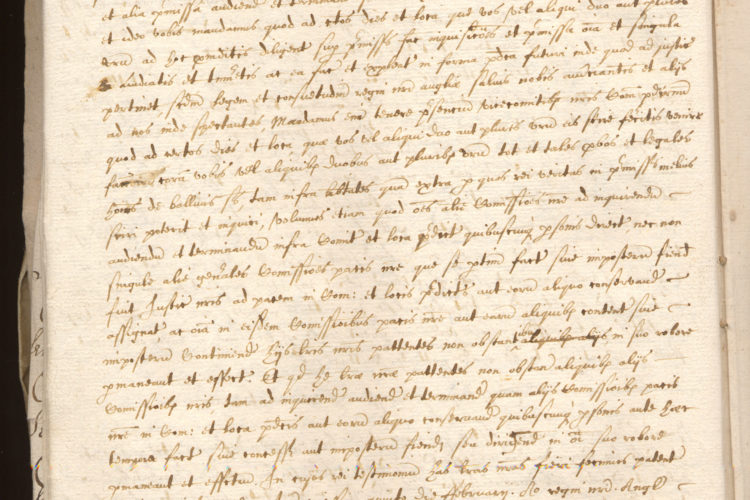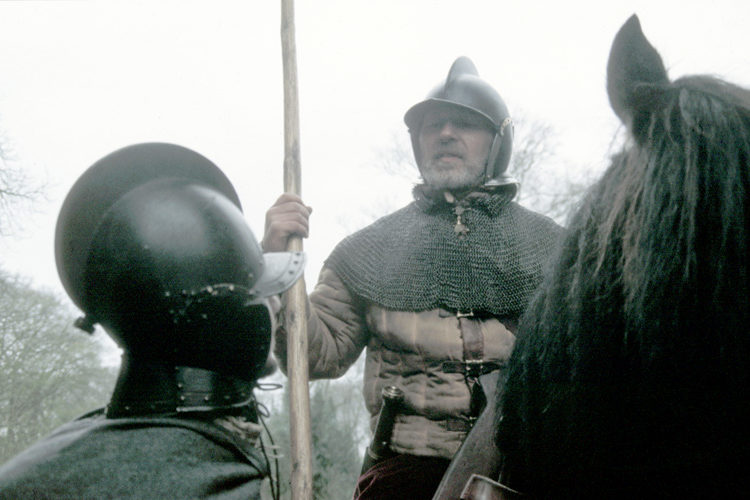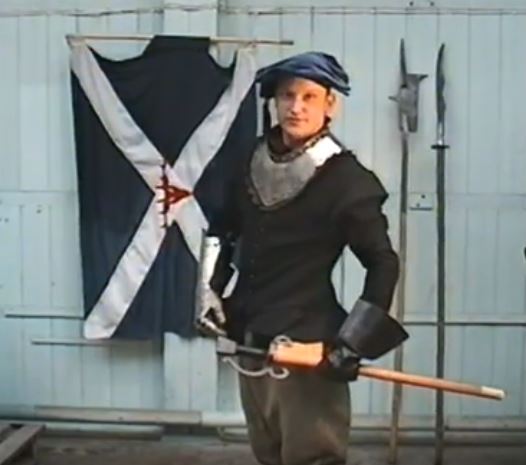The 'Peaceful Persuasion' And Transplanting Of The Marchmen By James VI Scotland & I England/Scotland…

Grahams offer mouth of canon, block or gibbet but their “evil colony” is banished. Did Maharg “comes back”
Grahams Disturb the Pacification of Borders 1604 / 1605
February 14, 1604 [-5]. Whitehall. The Council to the Commissioners appointed for the government of the late borders.
Instructions as to the execution of the commission.
Those malefactors of the surname of Graham who have been received to their submission are not to be meddled with for any offences committed before their submissions. Persons under bail to appear at the gaol delivery are to be left for trial there.
All persons living within the bounds of the commission, or in certain other specified districts, are to be forbidden the use of all manner of armour and weapons, and of horses, “savinge meane naggs for their tillage,” excepting noble men and gentlemen and their household servants.
The evidence of a Scotsman against an Englishman, and of an Englishman against a Scotsman is to be received.
See Cumbria Archives DPEN/216/f.2 and the original folio 21 in this site.
Commissioners for the Pacification of the Borders state the circumstances in 1605 that they think will bring peace.
The Border Reivers had ignored the laws of Scotland and England and even ignored the Leges Marchiarum that were designed to suit their situation. Skirmishes and thieving had made the borders a lawless place. King James saw no need for a border, nor for the Wardens of the Marches so they were abolished.
In the period between the death of Elizabeth and the succession of James, the Grahams, Armstrongs, Elliots and others thought that no law prevailed so they went on a thieving rampage which became known as “Ill Week”.
The Grahams were singled out for special treatment as this transcript explains:
April 17, 1605. Dumfries.
The Commissioners to the Council. We met at Carlisle on the 6th inst., and summoned all the Grahams who were bound for themselves and their followers. Whereas two of every branch were bound, we have ordered that six of the principal of every branch shall be bound for themselves and their followers, and that each of these six shall find two sureties. We have made orders for the better government of the broken people of either country, subject to reform by the Council. We send a list of one hundred and fifty Grahams who have submitted themselves, and whom we think most fit to be sent away. Many of the said Grahams appear to be poor labourers and under tenants to the rest. Many complaints are made by English and Scots alike about offences made before the death of the late Queen.
Grahams offer to go the mouth of the canon, block or gibbet to show their loyalty to the king (and get a better deal)
Some Grahams thought that by volunteering for military service they may have better conditions for themselves and their families than if they were expelled without any rights, as this transcript explains:
f.20. June 30, 1605. Carlisle.
The fifty Grahams sent to Brill to the English Commissioners. Many of us who were true men confessed ourselves offenders. By reason of the Earl of Cumberland’s promise that provision should be made for our wives and children, nearly a thousand in number, as good as that which we had upon Esk. We therefore pray for the fulfilment of this promise. We could in a month raise three hundred able men to serve his Majesty under our own leaders. We are willing to go to the mouth of the cannon, to the block, or to the gibbet, to show our loyalty.
The Notorious Grahams are mentioned extensively at this page
The transcription was made by the Historical Manuscripts Commission and the copyright has been released into the public domain by instruction of the government. The folios are in the Pennington Archive in the care of Whitehaven Records Office.
The page has not been fully transcribed so please download a larger copy, transcribe it and send your transcription via the comments section below.
April 17, 1605. Dumfries Folio 06a Select small file size or large size
June 30, 1605. Carlisle. Folio 20 Select small file size or large size
Complaint that Scotland Hides Fugitives During Pacification Of The Borders
A complaint by English Commissioners that known troublemakers are openly living in Scotland against King James I wishes.
The Border Reivers had ignored the laws of Scotland and England and even ignored the Leges Marchiarum that were designed to suit their situation. Skirmishes and thieving had made the borders a lawless place. King James saw no need for a border, nor for the Wardens of the Marches so they were abolished.
The process of pacifying the borders was bound to raise suspicions and challenge established loyalties. The unification of the crowns was a change of culture and tradition that would have many difficulties. This is an example of one side harbouring fugitives from the other side.
f34b September 13, 1605. Carlisle.
The same to the Scottish Commissioners Common report says that the Armstrongs of Kinmouth, who were the principal prisoners who escaped from Carlisle Castle, remain quietly at their houses and that Hutchin Graham with his followers, who were the chief causers of the disobedience of the Grahams, go openly up and down in Scotland. This is a hindrance to the King’s service, and a pernicious example. Four of the Grahams who were sent to Flushing (whose names are given) have returned without licence and fled to Scotland. Pray give order that they may be apprehended.
The page has not been fully transcribed so please download a larger copy, transcribe it and send your transcription via the comments section below.
June 30, 1605. Carlisle. Folio 20 Select small file size or large size
The Grahams Con Their Way Back To The Borders
A wonderful account of a group of Grahams managing to cheat and con their way back to Britain after expulsion from their lands.
The Grahams were a lawless reiving clan who ignored all conventions and loyalties except to each other. Their duplicity had made them enemies of the Scottish and English authorities and so during the Pacification of the Borders they were singled out for exile and their lands confiscated.
Exile meant that they should have been sent abroad to fight for the newly united crown of England and Scotland, and they should have remained abroad forever. However in a clever con they seem to have persuaded their foreign hosts that they were due leave and they forged a passport to make one of them seem to be an officer in charge of returning them to the borders on leave!
October 19, 1605. Whitehall. The Council to the English Commissioners.
His Majesty has been acquainted with your care and diligence in sifting out the manner and means of the return of the Grahams from service in the Low Countries. His pleasure is that all who have come with a pass shall be sent back to Newcastle to be there embarked and returned to the captain under whom they served. We have written to the Mayor of Newcastle and to Viscount Lisle, Governor of Flushing.
It has been usual to grant leave of absence for two months to ordinary soldiers, and the Governor and his deputy did not know that the men sent over from your parts were destined to remain beyond the seas without returning. You are to proceed according to justice against those who have returned without hence concerning their former offences, and keep them in prison until his Majesty’s pleasure is known. The passports subscribed by the name of Philip Thormington are counterfeit, for he is not captain of any company in those parts. Sir H. Leigh has done acceptable service in procuring the submission of Hutchin Graham, who is to be detained in Carlisle Castle until further directions. When these orders have been obeyed, Sir W. Lawson is to repair to Parliament.
The page has not been fully transcribed so please download a larger copy, transcribe it and send your transcription via the comments section below.
October 19, 1605. Whitehall. Folio 40b Select small file size or large size
Grahams, as an Evil Colony, Seek to be Banished to Spend Days in Sorrow
An extraordinary plea from the Graham clan to be banished from the borders or a ploy to mitigate against a harsher penalty?
The Grahams were a lawless reiving clan who ignored all conventions and loyalties except to each other. Their duplicity had made them enemies of the Scottish and English authorities and so during the Pacification of the Borders they were singled out for exile and their lands confiscated.
This plea may have been a last attempt to offer loyalty to the new united crown of Scotland and England and thus hopefully deflect the more harsh penalty of being forced into permanent military service in Europe.
August 14, 1605
f. 60. Petition to the King from Walter Graham of Netherby, and seventy-eight others, for the most part bearing the name of Graham. We and others, after the death of the late Queen, disorderly and tumultuously assembled with all the warlike force and power that we could, and invaded the inland part of the eastern side of Cumberland, and spoiled many Englishmen, with fire, sword, robbery, and murder. Some among us of evil judgement had persuaded us that until your Majesty was a crowned King in England, the laws of the kingdom ceased and were of no force, and that all offences done in the meantime were not punishable.
We have deserved death and the confiscation of our lands and goods. Many of us have wives and children who may be able, with better education, to do good service to your Majesty in some other parts of your dominions. We therefore pray that we may be relegated and banished, as an evil colony, to some other parts of your kingdom, there to spend the residue of our days in sorrowing for our offences. We bind ourselves and our posterity to be of good behaviour towards all your subjects.
The page has not been fully transcribed so please download a larger copy, transcribe it and send your transcription via the comments section below.
August 14, 1605. Folio 40b Select small file size or large size
Black Mail Recorded by the Reiver Hutchin Graham
Possibly the first account of the use of the word black mail. The Reiver Hutchin Graham extorts goods for his “protection”
This is possibly the first account of the use of the word black mail. The Reiver Hutchin Graham extorts goods for his “protection” from the town of Cargo.
The Reivers introduced the word “be reived” (bereaved) into the language and this record shows how blackmail was a common way of life in the troubled borders.
June 24, 1606
f. 125. Note of the particular misdemeanours of Hutchin Graham.
1. On Monday after the death of the late Queen, he neglected to stay his friends from their invasion, although admonished to do so by the Bishop of Carlisle, who saw them from the ramparts of the castle.
2. On Tuesday following he brought one hundred and forty of his kinsmen and friends, English and Scottish, to the town of Cargo, near Carlisle, and provided them with victuals for themselves and their horses, free of cost, at the charge of the town. He had for many years taken this town into his protection, receiving from each husbandman four pecks of malt yearly for black mail, these pecks being of Carlisle measure, 20 gallons to the bushel.
3. On the Wednesday following, he crossed the Eden into Grinsdale, where he and his company as men of war erected two pensills of linen cloth on the tops of lances.
4. On that day he and his company, armed with jacks, spears, pistols, and steel caps, assaulted Capt. Bowyer, or his lieutenant, and his soldiers.
5. Seeing a company of the townsmen of Carlisle coming to the rescue of his Majesty’s soldiers, he and his company went westward. They spoiled a place called Bow, robbing men in the way, and afterwards spoiled the town of Orton, where they burned the house of Johnston and took prisoners.
6. He went back to Cargo, and there divided such spoil as was brought in by his company, he and young [Graham of] Netherby as captains taking an eighth of the whole spoil.
7. Having obtained from the King a promise of remission, he has not made restitution to the parties grieved. He refused to go to the Low Countries, and became a ringleader of nineteen others of his name, who fled into Scotland. Subscribed by the English Commissioners.
The page has not been fully transcribed so please download a larger copy, transcribe it and send your transcription via the comments section below.
June 24, 1606. Folio 125 Select small file size or large size
Folklore: Graham name goes, but Maharg “comes backward” Did the Graham people try to reverse their reputation? No!
The amusing but inaccurate suggestion that the clan called Maharg was the same as Graham spelled backwards is unfortunately false. The modern day spelling of Graham was not used because spelling was phonetic ie write it as it sounds. Thus the name is variously written as Graym, Grame, Greme and Greyme. The name “Maharg” derives from the Gaelic. However, many exploits of the Grahams were mischievous and incredible such as impersonating their captain and falsifying their forgiveness in order to return to their homeland.
Not all Grahams were treated badly, one was honoured
Royal grants of lands and rights in Nicholforest and in [part of] the Debatable Lands in Cumberland, to speed their pacification
This district was granted to the Cliffords in 1603/4 and 1610. In 1628 Charles I re-granted it to his friend Richard Graham, late of Plomp in Kirkandrews-on-Esk, one of the Duke of Buckingham’s followers. Richard Graham had bought this estate from Francis Clifford (Lord Cumberland) on 21 May 1628; he was knighted on 9 January 1628/9, and created Baronet on 29 March 1629.
See Cumbria Archives Transactions Cumberland and Westmorland Antiquarian and Archaeological Society, New Series, 11 (1911), 79-80; 14 (1914), 153; Nicolson and Burn Volume 2, 465-466; C. R. Hudleston, R.S. Boumphrey, and J. Hughes, Cumberland Framilies and their Heraldry (1978), 135
These are large parchment documents in Latin. Each has a portrait of the King at the head. The first two documents have the royal portrait in colour with highly-ornamental margins; the third has plain margins and monochrome royal portrait.



